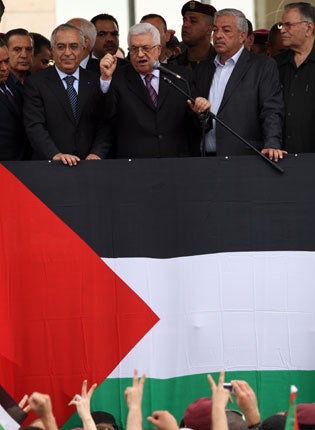Israel warns of repercussions if Palestine state bid succeeds

Your support helps us to tell the story
From reproductive rights to climate change to Big Tech, The Independent is on the ground when the story is developing. Whether it's investigating the financials of Elon Musk's pro-Trump PAC or producing our latest documentary, 'The A Word', which shines a light on the American women fighting for reproductive rights, we know how important it is to parse out the facts from the messaging.
At such a critical moment in US history, we need reporters on the ground. Your donation allows us to keep sending journalists to speak to both sides of the story.
The Independent is trusted by Americans across the entire political spectrum. And unlike many other quality news outlets, we choose not to lock Americans out of our reporting and analysis with paywalls. We believe quality journalism should be available to everyone, paid for by those who can afford it.
Your support makes all the difference.Israel's hardline foreign minister, Avigdor Liberman, warned of "tough repercussions" if President Mahmoud Abbas won his UN bid for Palestine statehood recognition, as Mr Abbas returned to an enthusiastic welcome from Palestinians in Ramallah.
Mr Lieberman's warning came as Mr Abbas said he expected the UN Security Council to decide on his application for statehood within "weeks" rather than months.
The US has already said it will cast its veto if it cannot command the necessary nine-country majority against the Palestinians' application for full UN membership at the Security Council, which holds a preliminary meeting on the issue today.
But that still leaves open the possibility that Mr Abbas and his team will subsequently lodge an application for lesser "non-member state" status through the General Assembly, where it commands a built-in majority.
The Israeli foreign minister declared on Army Radio: "If the Palestinians will indeed pass a one-sided resolution, if not in the Security Council then the General Assembly, that would bring us to an altogether new situation and this would have repercussions, tough repercussions." With Israel's Cabinet yet to take a decision on what, if any, measures it might take in response to the UN bid, Mr Lieberman avoided specifics, including two ideas already floated: withholding customs revenues from the Palestinians and "annexation" of settlement blocs in the West Bank.
The White House and Defence Minister Ehud Barak have said moves to withdraw funds from the PA would threaten vital co-operation between Israel and Palestinian security forces.
Any further response will await Mr Netanyahu's return from the US today. The same applies to its formal response to the call by the Quartet – the UN, EU, Russia and United States – for direct negotiations between the two sides.
Palestinian officials were considering the call last night but their negotiators have suggested it will be rejected as it fails explicitly to prescribe a settlement freeze and terms of reference making it clear the borders of a Palestinian state should be based on those before June 1967.
Israeli leaders were leaning strongly last night towards accepting the Quartet terms, and repeating their call for resumed negotiations. Mr Lieberman, in the past a serial sceptic about negotiations with the Palestinians, said Israel should accept the Quartet's terms because they had no "preconditions."
Stone-throwing clashes took place in the West Bank last night, after Jewish settlers protesting at the death of a man and his son on Friday near the Hebron area settlement of Kyriat Arba, marched through a Palestinian village.
Police had said there was a "strong possibility" the death of the settler and his son were caused by stones thrown by Palestinians.
Meanwhile the Palestinian Authority urged tougher curbs on settlers after what it said was the uprooting of hundreds of trees by settlers near the village of Qusra in the Nablus area.
A Palestinian was killed on Friday in Qusra by Israeli troops after residents gathered in response to an invasion of the village by settlers.
Despite the heightened tensions, Mr Abbas – his popularity at home strengthened significantly by the UN move – was jubilant, declaring to thousands of Palestinians cheering and waving flags that the "Palestinian Spring" was upon them.
"We have told the world that there is the Arab Spring, but the Palestinian Spring is here," he said. "A popular spring, a populist spring, a spring of peaceful struggle that will reach its goal."
Join our commenting forum
Join thought-provoking conversations, follow other Independent readers and see their replies
Comments